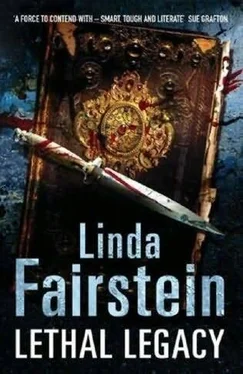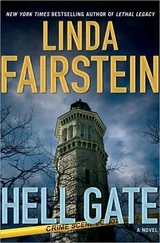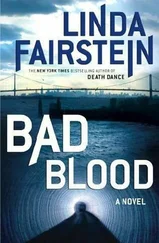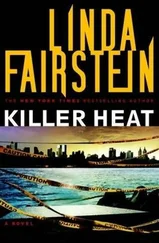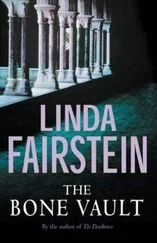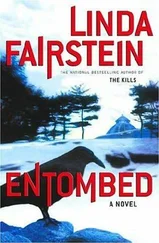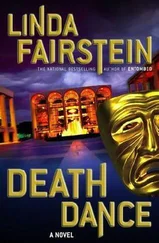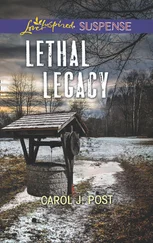“Stopped the Frenchman in his tracks when I told him to wrap it up for me. At auction today, it would draw double. After that I had to have everything Fitzgerald I could find. Hemingway next. Dos Passos. Wolfe. It’s totally addictive.”
“You obviously moved on to older collectibles, too,” I said, scoping the room.
“I had to teach myself about them. See, the great private libraries have been amassing rare books for centuries.” Krauss crossed the room, pausing in front of the Bloomberg, then continued on to shelves stocked with leather-bound books of all sizes. “I didn’t know Keats from Yeats, Samuel Johnson from Samuel Pepys. But I’m a quick study.”
He stopped in front of a shelf on which an open book rested in a cradle, two matching volumes standing beside it. He picked them up and offered them to Mike and me to admire. Each was bound in black leather, inlaid with mother-of-pearl. “Beautiful, huh?”
The silver writing, embellished with an intricate floral design, announced that we were looking at Charlotte Brontë’s Jane Eyre. “Three volumes, 1847. The library has a set of its own, without the inlay. It’s even got the writing desk Brontë used when she traveled.”
His excitement seemed quite genuine, and he clearly wanted us to appreciate the collection.
“Do you have any atlases?” Mike asked. I figured he was testing Krauss about his interest in maps.
“Not my thing,” Jonah Krauss said, as he saw Mercer reach for a book that was displayed on a shelf at the far end of the room. “Whoa, you don’t want to pick that one up, Detective. Some of the pages are loose.”
“Sorry,” Mercer said, replacing the large book on its stand and repeating the title on the spine. “It looks like the court record of an old English trial. The 1828 proceedings against the murderer Aaron Keyes.”
Krauss looked nervous. He stepped in front of Mercer and rested his fingers on the open page. “It’s, uh…different.”
“Different how?” Mercer asked.
“It’s…it’s an anthropodermic binding, Mr. Wallace. Extremely rare. Most unusual to find.”
“Anthropodermic?” Mike asked. “Help me out, Coop. Means what?”
“Don’t know.”
“The binding is made from human skin,” Jonah Krauss said, folding his arms and speaking quietly. “That inquest record is bound in the skin of the murderer, Detective.”
Mike lowered his head. “It doesn’t get much creepier than that.”
“Aaron Keyes raped and killed a young girl in the English countryside. He was sentenced to be hung, and after that his skin was tanned and used to make this binding.”
“Human skin?” Mike asked. “You’re not joking?”
“Not at all, Detective. Most libraries don’t want books like these, of course-although Harvard has a few-but many private collectors do. It’s a very specialized market, human skin. Not for everyone’s taste.”
Krauss turned away from the book and went back to his desk. His lips parted and the whitener on his teeth reappeared. “Lighten up, guys. It’s from the murderer, not the dead girl.”
Mike Chapman wasn’t amused. “Like you said, Mr. Krauss. Your library is your portrait.”
“That’s frigging sick,” Mike said, when Krauss stepped out of the room to give Britney a new ETA for his pilots.
“Doesn’t make him a killer,” Mercer said.
“Sorry,” Krauss said when he returned. “What else can I do to be useful?”
“Let’s go back to your last conversation with Tina Barr, when she asked you about the consortium looking for the map,” Mike said.
“I didn’t have anything more to say,” Krauss said, packing some folders into a soft leather briefcase. “I told her it was a bust, okay? I thought maybe she was getting mixed up with the wrong people. I cautioned her to be careful.”
“Careful of the wrong people? Alger Herrick? Minerva Hunt, or her father? That’s who Tina was working for most recently.”
“When she asked me the question, I was actually worried that Eddy Forbes had gotten to her. He’s a very seductive guy.”
“You think he went after Tina as a romantic interest?” I asked.
Jonah dismissed me with the back of his hand. “Not that kind of seductive. He was a genius at scamming the best collectors. Had his own gallery and a handful of rich clients who trusted his judgment implicitly. Forbes had the cunning to steer some of these serious collectors to donate important works to the library, and once the transaction was complete, he stole from those very treasures.”
“Don’t people bother to ask what the source of a rare sixteenth-century map is when they go to buy it?”
“A guy like me might hondel a bit, Ms. Cooper. Bargain hard, ask questions, get tough in a negotiation. That’s my nature. Eddy just has to whisper in the ears of those old buzzards that some fourth-generation blowhard had gone through the family fortune and had to break up the jewels. All hush-hush, ’cause every one of these dynasties has had deadbeat offspring who might come to the same end. Circle the wagons. Building, inheriting, and disposing of these library pieces has a tremendous element of secrecy involved.”
“Secrecy?” I asked.
“In the antiquarian business, knowing where the books are-the atlases, the maps-whose hands they’re in, that knowledge is power. It’s money. And a great many of these things that have been in families for generations aren’t even insured. They couldn’t possibly be, at today’s prices. There are things inventoried in the great private collections of the world that haven’t been seen for decades, so it’s impossible to know what’s become of them,” Krauss said, holding his forefinger to his lips. “That’s why I told Tina Barr to be careful.”
I didn’t like Jonah Krauss, and he could smell that.
“You want to tell us about yesterday afternoon? About where you were last night?” Mike asked.
“You guys are serious, right? I don’t believe this. I ran a meeting in our conference room till six-thirty. Britney can give you the names of all the attendees. Then my driver picked me up and took me to the Bronx. Is that a crime?” Krauss reached into his warm-up jacket and pulled out the thinnest phone I’d ever seen. He pressed an icon and then hit zoom. “Have a look, Detective. Yankee Stadium with my boys. Right up until the bitter end.”
“Great seats,” Mike said, passing me the phone. Krauss had taken snapshots of his two young sons from his box, right over the dugout.
I handed him back the phone and he put both hands up in the air. “Who sent you here, really? Some of those trustees just hate my guts, don’t they? Try to mix me up in a murder case.”
“Who hates you?” Mercer asked. “And why?”
“Now, that’s something I really don’t have time to answer today.”
“Put your bag down, Jonah, and take a seat,” Mike said. “Give it a try.”
“If you had any idea of the turmoil inside the public library-inside most libraries-you’d be able to understand the depth of the animosity, Detective. It all looks so scholarly and benign from the outside, but there are real battles being fought,” Krauss said, refusing to sit.
“Over what?”
“Start with the future of the library. What do you think the biggest problem is?”
“Funding,” I guessed. “Money to keep a facility like this-”
“We’re pouring money into it, Ms. Cooper. The problem is that ten years from now, who’s going to need a library?” Krauss was snarling at me. “Our attendance has been plunging for years, not just in New York but all over the world. Research libraries like ours in particular. The computer and the Internet are killing us, making us obsolete. We’ve been given a conservative estimate that at least ninety-five percent of all scholarly inquiries begin on Google.”
Читать дальше
